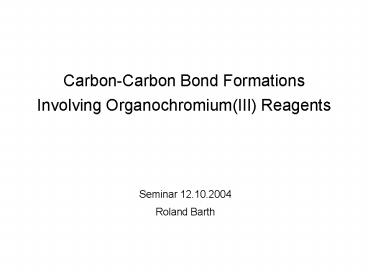CarbonCarbon Bond Formations Involving OrganochromiumIII Reagents
1 / 20
Title:
CarbonCarbon Bond Formations Involving OrganochromiumIII Reagents
Description:
b: direct reaction of organic halide with a CrII species ... Reactions with Alkenyl Halides and Triflates Addition to Carbonyl Groups ... –
Number of Views:111
Avg rating:3.0/5.0
Title: CarbonCarbon Bond Formations Involving OrganochromiumIII Reagents
1
Carbon-Carbon Bond Formations Involving
Organochromium(III) Reagents
- Seminar 12.10.2004
- Roland Barth
2
Organochromium (III) Reagents
- Alkenylchromium (III) Reagents
- Nozaki-Hiyama-Kishi coupling, Stoichiometric and
catalytic processes - Alkynylchromium (III) Reagents
- Allylchromium (III) Reagents
- More Organochromium Methodology and
Applications - Enantioselective additions, Cr(II) mediated
Reformatzkij reaction, Takai Reaction
3
Preparation
- a transmetallation with organo-MgX or organo-Li
reagents - b direct reaction of organic halide with a CrII
species - (usually allylic, propargylic and alkenyl
halides)
4
Reactions with Alkenyl Halides and Triflates
Addition to Carbonyl Groups
Reaction conditions room temperature polar,
aprotic solvent
Advantage high chemoselectivity!
a,b-unsaturated aldehydes 1,2-addition only
geometry of double bond is
maintained for disubstituted olefins
trisubstituted olefins give the
(E)-configurated allyl alcohol
CrCl2 commercially available or generated in
situ
CrCl3 LiAlH4 CrCl3 Na(Hg) CrCl3 Zn or Mn
5
Traces of Nickel are necessary!The
Nozaki-Hiyama-Kishi (NHK) Coupling
Stoichiometric amounts of CrCl2 with 1 NiCl2 or
Ni(AcAc)2
6
Application of CrII-promoted Couplingin Total
Synthesis
- Palytoxin
7
- Brevetoxin B
- Application of lactone-derived enoltriflates in
the NHK-coupling - Halichondrin B
8
- Brefeldin
- An intramolecular version of the NHK-coupling
Macrocyclisation is successful by an
intramolecular NHK-coupling
9
Stoichiometric Setup versus Chromium-catalysed
Reactions
Stoichiometric reactions
Cr(II).(large) excess (gt2 eq.) polar, aprotic
solvent (DMF, THF, DMSO,)
donor ligands for complexation (TMEDA,) 4-tert.-b
utylpyridine
Chromium-catalysed processes
Advantage
Only 15 mol CrCl2 MnCl2 weak Lewis acid
10
Alkynylchromium(III) Reagents
- Reductive dimerisation
- Addition to aldehydes
excellent chemoselectivity stoichiometric or
catalytic
selective 1,2-addition
11
Application in Total Synthesis
- Discodermolide
- Enediyne toxins
12
Allylchromium(III) Reagents
- stoichiometric or catalytic, no Ni necessary
- regioselectivity with substrates bearing ketone
and aldehyde group - but ketones can also be used ester groups are
not reactive - allylic rearrangement
- primary allylic halides (tosylates) exclusively
- new stereocenters ? good stereocontrol
- a,b-unsaturated aldehydes 1,2-addition
- (E) and (Z) isomers give same product mixture, no
effect on configuration of new stereocenters
13
Allylchromium (III) Reagents
14
Stereochemistry (1)
- (E)- and (Z)-crotyl halides give the anti
addition product
15
Stereochemistry (2) Substrate-Controlled
Stereoselectivity
addition governed by steric factors, (almost) no
chelation control
16
Examples from Total Synthesis
- ent-Castanospermine
- Asperdiol
17
More OrganochromiumEnantioselective Additions
No general solution up to now!
18
More OrganochromiumCr(II)-Mediated Reformatzkij
Reaction
Syn gtgt Anti
Also a-halo esters, -lactones, -nitrils, -amides
19
More OrganochromiumThe Takai Reaction
Iodoolefination
(E) gtgt (Z)
20
References
- General literature
- A. Fürstner Chem. Rev. 1999, 99, 991-1045
- M. Schlosser Organometallics in Synthesis
Wiley 2002 - Synthesis
- Palytoxin JACS 1986, 108, 5644-5646
- Brevetoxin B JACS 1995, 117, 1171
- Halichondrin B TH Lett., 1996, 37, 8643
- Brefildin JACS 1988, 110, 5198
- Discodermolide JACS 1996, 118, 11054
- Enediyne toxins TH Lett., 1997, 38, 5583
- Ent-Castanospermine JOC, 1992, 57, 3194-3202
- Asperdiol JOC, 1983, 48, 4785
- Takai Reaction
- JACS 1986, 108, 7408-7410































